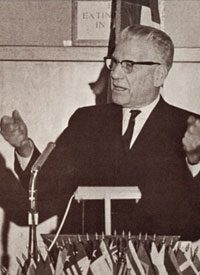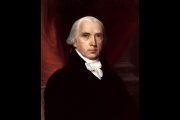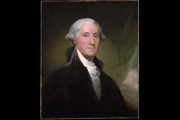
History is replete with the deeds of successful individuals. Some rose to prominence as the builders of businesses while others served as the leaders of some noteworthy organizations. Still more made their marks as philanthropists, or served their nations in patriotic or religious endeavors, or spent their time and energy to make their own communities better places to live. There are very few of course who, in a busy lifetime, do all of this. William J. Grede was one of those very few.
Born in 1897 and raised in Milwaukee, Bill Grede never considered any other place home. The product of strict but loving parents (his stepmother, whom his dad, Henry, married after his first wife died, was to Bill “the only mother I ever knew”), Bill went to work at his father’s carriage shop during summers when he was 14. He later worked at Uncle Art’s tire store. The experiences he gained at both taught him two very important lessons: 1) always provide quality products and service; and 2) there is profit to be made in integrity.
During Bill’s early years, the Milwaukee area was a hotbed of socialism. But the Grede family never got caught up in it. Bill learned many distinctly opposite views through reading the works of Horatio Alger and watching the way his father and uncle worked. He also benefitted mightily from a high-school economics teacher who “drilled” into his charges timeless principles Bill never forgot.
He spent only two years at the University of Wisconsin, where he profited greatly from reading an assigned work entitled The Responsibility of Freedom. Asked frequently where he developed his philosophy of freedom and his belief that he was required to maintain and promote it, he would always point to that book. During the summer break after his first year, Bill also learned a lot about marketing by selling pots and pans door to door and at church suppers, where he demonstrated the value of his products by cooking the meal using them.
In 1917, family friend Albert Wagner purchased a small foundry in Decatur, Illinois, and lured Bill to be his assistant at the then-generous salary of $150 a month. Bill learned a lot about the foundry business, but his patriotic instincts overcame his business pursuits. In September 1918, after several unsuccessful attempts to enlist in the military, Bill won acceptance for army officer training and went off to Georgia. He won his commission just as World War I ended and was promptly discharged. He had already married high-school sweetheart Margaret Weiss, and he parted company with the Decatur foundry and headed back to Milwaukee. Soon, with a little money he’d accumulated plus some help from willing investors, he purchased Liberty Foundry in the Milwaukee suburb of Wauwatosa. On August 13, 1920, at the ripe old age of 23, Bill Grede was the sole proprietor of a company with 40 employees. Liberty Foundry’s fortunes improved markedly from that day forward.
Careful study and experimentation with workmen’s output convinced Bill that the nine-and-a-half-hour workday and six-day work week weren’t needed to maintain productivity. In phases, he shortened the day schedule to eight hours and then eliminated Saturdays. In 1924, Liberty bought group life insurance for employees. In 1926, Grede inaugurated paid vacations for workers. And in 1927, he added accident and health insurance for all. He later developed a pension plan for his employees. These were years when the term “fringe benefits” hadn’t even been coined. Each of these innovations was unique in the manufacturing industry, but Grede accepted no accolades for what others termed his “humanitarian gestures.” He said he was merely acting in self-interest knowing that he would retain his best employees, all would produce at high levels, and the company would earn a profit.
In no time, it seemed, Bill Grede became known as “the boy foundryman from the West.” Adhering to his father’s counsel that he “be honest, work hard, and smile,” he and his company developed an excellent reputation in the industry. When other businesses were failing, Liberty Foundry was expanding.
In 1927, a Liberty customer told Bill of his need for a speciality product that he knew Liberty wasn’t equipped to make. But he so admired the way Bill Grede did business that he suggested Bill purchase Spring City Foundry in nearby Waukesha where the product could be made. Bill liked the suggestion, bought the struggling foundry, satisfied his customer’s needs, and rapidly improved his new acquisition’s profitability and product quality. The Grede name became even better known in the industry.
He then persuaded brother Art to join him just prior to the 1929 depression. The nation’s economic problems forced them to retrench slightly, but they not only survived, they added Milwaukee Steel Foundry to their holdings in 1932. In 1940, the three Grede-owned foundries were united as Grede Foundries Incorporated. Before long, three other foundries, one each in Michigan, Kansas, and Wisconsin, were added. From 40 employees in 1920, Grede Foundries was now employing 2,000.
A Foe of Compulsory Labor Unions
Bill Grede’s belief that each person is an individual who should be treated like an individual formed the basis of his opposition to labor unions. He never turned over to a labor union, or to any third party, the right of an employee to bargain for himself. Union organizers repeatedly sought to get Grede employees to vote for a union, but they never did. Grede would tell anyone that unions aren’t needed by employees of a company that knows and practices the American Way. In speeches or in answer to questions about his attitude, he’d always tell the story about the cows:
When I was a kid, I used to go out to my uncle’s farm near Big Bend, Wisconsin, and help with the chores. I learned how to milk a cow and, back in those days, a cow barn wasn’t a very pleasant place. You had to wear boots to walk into the cow yard and it was full of flies and pests. And I used to think while I worked there, that when my uncle went out to milk those cows with his cold hands, it couldn’t have been very comfortable for the cows. But go to a modern dairy farm and see the cow barn now — automatic barn cleaners, insecticides, screen doors, no insects, and when it comes to milking time, they take the pre-heated rubber cups of the milking machine and they put these on the cow. It must be kind of comfortable for the cows; certainly a contrast with the cold hands my uncle used to have. Why they even have music piped into the barn. Now that’s a heck of a lot of progress, isn’t it? And those cows never had a union!
He battled with the Congress of Industrial Organizations (CIO) and won. He battled with the United Auto Workers (UAW) and won. Whenever the National Labor Relations Board intervened on behalf of the unions to force an election where his employees would vote on whether they wanted union representation, the employees voted it down. But union organizers persuaded a minority of his workers to go on strike, causing disruption and even occasional violence and short-lived business slowdowns. Personal threats directed at him and his family led to the police providing round-the-clock protection during periods when the unions were campaigning at the Grede plants. But the unions never succeeded while Bill Grede was in charge, and his principled stand gave officials of other companies courage to respond similarly to labor’s demands. Area newspapers customarily sided with the unions against Bill Grede, but it didn’t matter to him. Bill Grede’s reputation as a better-than-fair employer, and his strong belief that every employee had the right to represent himself, triumphed again and again.
Already president of the Wisconsin Manufacturer’s Association by 1945, his business acumen and legendary attitude about labor unions led to a 1946 invitation to join the prestigious board of the National Association of Manufacturers. At the first NAM board meeting he attended, he forthrightly and promptly stated to the assembled industrialists and entrepreneurs, “I want you to know that I am anti-labor [union].” They accepted that and his influence within the NAM grew. Explaining his opposition to labor unions, he stated, “We are opposed to monopolistic control of labor through large labor unions which would attempt, with their powerful organizations, to gain control of the management of our property.” To him, property rights and the dignity of each worker were extremely important. During this period, he sent Henry Grady Weaver’s classic explanation of what freedom means, The Mainspring of Human Progress, to many friends and associates. Others then profited from this excellent work.
Accepting National Appointments
In 1926, Bill received a request to send a donation to the local Young Men’s Christian Organization (YMCA). He responded with $10. His token contribution prompted the organization’s state secretary to tell Bill rather bluntly that he should not only give more, but he should also serve on the Y’s fundraising committee. Bill accepted both challenges, and there began a lifelong commitment to the YMCA that saw him raise millions for its efforts, not only in Wisconsin and other parts of the United States, but in South America, Africa, and Europe. He saw the organization as a place where “the American spirit” would be kept alive, even spread. That spirit, he said, was “no accident but the product of deep spiritual convictions that had been won by bitter struggle and can be lost with tragic ease if we Americans take it for granted.” If a privately run organization like the YMCA didn’t exist, he maintained, “there would be increasing government control by bureaucrats who had not learned individual responsibility, integrity and Christian principles. It was these fundamentals that were instilled in all who attended the YMCA.”
Appointed to the National Council of YMCAs in 1940, Bill quickly became known throughout America as “Mr. YMCA.” In 1952, he served as president of the nationwide YMCA. He accepted the post because he saw that the Ys taught young people that individual freedom is “a religious discovery and that the very concept of individualism — exemplified in the life of Christ — is inherent in the purpose of the YMCA.” Before he passed away, however, Bill would lament that the organization he had helped so mightily over many years had drifted from its Christian and patriotic foundations.
As early as 1946, Bill had become a member of the board of directors of the NAM. Soon, he became a sought-after speaker and a sought-after guest on nationally broadcast radio programs. He spoke out against wage and price controls, government debt and deficits, inflation, and the Social Security system, which he described as “socialism that was neither secure nor social.” In December 1947, he debated the UAW’s Walter Reuther on the topic of a guaranteed annual wage. He had also become highly regarded while representing the NAM at congressional hearings examining taxation and government spending policies. In 1952, the NAM recognized his leadership abilities, knowledge, and determined defense of the American spirit, and asked to him accept the role as president of the NAM. He readily agreed to serve. He was now the top official in two nationwide organizations.
The year 1952 saw Bill Grede deliver 250 speeches in the United States, plus dozens of press conferences, media appearances, and testimony before Congress. In that year alone, he logged more than 85,000 miles. Other years found him doing almost as much speaking and traveling. Asked if he ever gave the same speech to differing audiences, he smiled and admitted, “It’s easier to get a new audience than to write a new speech.” The year 1952 also happened to be when he met and got to know Robert Welch, the founder of The John Birch Society.
The Grede-Welch Alliance
Robert Welch had been appointed to the NAM’s board as its representative from the candy-making industry. It took little time for the two men to become fast friends and solid allies. Bill Grede spent great effort trying to get fellow NAM members and others to listen to Welch. In 1958, when Welch launched the Society at a two-day meeting in Indianapolis, Bill Grede was one of the first to be invited, and among the first of the new organization’s members. Soon, Welch and the Society were subjected to a withering and completely unjust smear campaign. It was then suggested to Bill by some NAM colleagues that, because of his continued involvement in NAM, it might be best if he would leave the Society.
During the period when some NAM members fretted over Grede’s active membership in JBS, Bill was serving as a board member of the J. I. Case Company, a leading manufacturer of farm implements located in Racine, Wisconsin. Heavily in debt and facing extinction, the firm’s president resigned under pressure, and Bill, at an age when most men have retired, was named in his place. He then spent the better part of a year visiting creditors and revising company practices. His efforts saved the company and the jobs of 12,000 employees. The entire incident became a textbook case study at Harvard University Business School. Helping Case to survive added to the Grede legacy, and it even boosted the reputation of the NAM.
But Bill’s activity with JBS continued to rankle some. At a special NAM meeting held in early 1962, approximately 150 of its leading members questioned Bill Grede’s Society membership. With him in attendance, the discussion proceeded in such a way as to suggest that it might be a good idea, in view of his many connections to NAM, if Bill would leave the Society. Grede’s response was not what some of those men hoped to hear. They should have known better. He calmly and forthrightly told them: “If my membership in the Society is a problem, then I’ll be glad to resign from all connections to the NAM. The one thing I will not do is resign from The John Birch Society.” That ended the discussion and the NAM leaders took no action. Bill Grede continued to defend Robert Welch and the Society, and he steered many others into the organization.
Loved for his booming laugh, his penchant for editing his own work and anything else put before him, and his unfailing integrity, Bill was deeply admired by his employees and many who had come to know him. Equally admired was Margaret, his wife of 69 years who was so often at his side and in the front row for many of his speeches. If Bill Grede weren’t around at the time a decision needed to be made — in business or in any of his many other pursuits — someone would merely interject, “What would Bill Grede do?” and that would lead to a satisfactory end to the discussion. It was often said of him that his greatest accomplishment wasn’t what he had done, but what others have been inspired to do because of him.
When Bill Grede passed away in 1989, it could emphatically have been stated that America had lost one of her finest sons.



